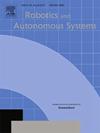以任务为中心的机器人群:通过专业角色实现效率最大化
IF 5.2
2区 计算机科学
Q1 AUTOMATION & CONTROL SYSTEMS
引用次数: 0
摘要
在分布式系统领域,如群体机器人和其他多智能体设置,劳动分工原则是一个基本的基石。在这项研究中,我们提出了一种任务专业化的方法来研究机器人群体。该框架集成了用于任务分配的匿名享乐博弈和用于系统区域覆盖的希尔伯特空间填充算法。针对高效觅食问题,我们对我们提出的专业化方法和传统的多任务策略进行了深入的比较分析。我们建立了两种不同的群体配置:多任务群体,其中代理执行各种子任务,以及专门的群体,包括专注于特定子任务的子团队,即存款搜索和运输。在整个研究过程中,我们考虑了不同的环境情况和不同的沉积物分布,评估了诸如沉积物收集和行驶距离等性能指标。专门的方法利用享乐游戏的力量在子团队中优化分配任务,确保有效的资源运输到基地。我们的研究结果揭示了专业化群体策略的优势。通过任务专门化,我们实现了更高的可伸缩性,减少了资源消耗,对动态环境的适应性,以及在代理不可用的情况下的弹性。本文章由计算机程序翻译,如有差异,请以英文原文为准。
Task-focused robotic swarming: Maximising effectiveness via specialised roles
In the realm of distributed systems such as swarm robotics and other multi-agent setups, the principle of labour division stands as a fundamental cornerstone. In this study, we propose a task-specialised approach to robotic swarming. The framework integrates an anonymous hedonic game for task allocation and the Hilbert Space-Filling Algorithm for systematic area coverage. Focusing on the problem of efficient foraging, we conduct an in-depth comparative analysis between our proposed specialised approach and the conventional multi-tasking strategy. We establish two distinct swarm configurations: the multi-tasking swarm, where agents perform various sub-tasks, and the specialised swarm, comprising sub-teams focused on specific sub-tasks namely deposit searching and transportation. Throughout our investigation, encompassing diverse environmental scenarios with varying deposit distributions, we evaluate performance metrics such as deposit collection and distance travelled. The specialised approach harnesses the power of hedonic games to allocate tasks optimally within sub-teams, ensuring efficient resource transportation to the base. Our results reveal the advantages of the specialised swarm strategy. Through task specialisation, we achieve heightened scalability, reduced resource consumption, adaptability to dynamic environments, and resilience in the presence of agent unavailability.
求助全文
通过发布文献求助,成功后即可免费获取论文全文。
去求助
来源期刊

Robotics and Autonomous Systems
工程技术-机器人学
CiteScore
9.00
自引率
7.00%
发文量
164
审稿时长
4.5 months
期刊介绍:
Robotics and Autonomous Systems will carry articles describing fundamental developments in the field of robotics, with special emphasis on autonomous systems. An important goal of this journal is to extend the state of the art in both symbolic and sensory based robot control and learning in the context of autonomous systems.
Robotics and Autonomous Systems will carry articles on the theoretical, computational and experimental aspects of autonomous systems, or modules of such systems.
 求助内容:
求助内容: 应助结果提醒方式:
应助结果提醒方式:


